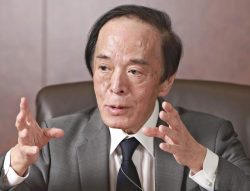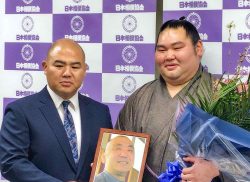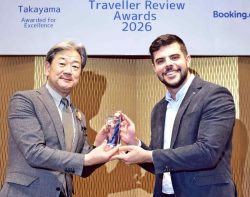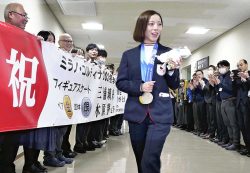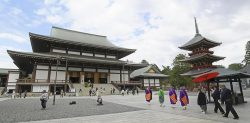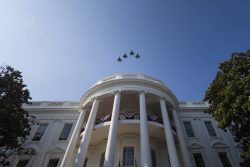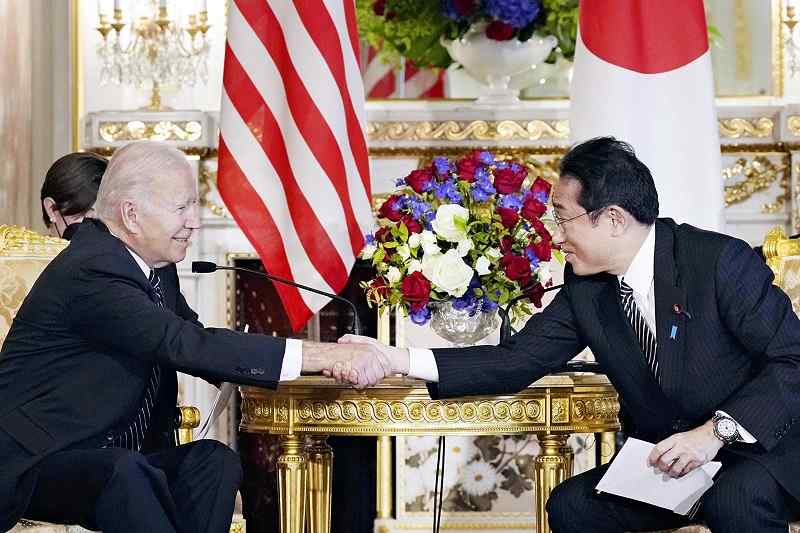
Prime Minister Fumio Kishida and U.S. President Joe Biden shake hands during their summit in Tokyo on Monday.
7:00 JST, May 25, 2022
The U.S.-led Indo-Pacific Economic Framework (IPEF) was launched Monday, with the pact positioned as an alternative to the Trans-Pacific Partnership free trade agreement as part of Washington’s efforts to counter China.
Out of consideration for U.S. public opinion, IPEF stops short of opening up markets through tariff reductions. Whether it will become an effective economic partnership remains to be seen.
In the opening remarks of Monday’s bilateral summit with Prime Minister Fumio Kishida, U.S. President Joe Biden said the purpose of IPEF is “to increase our cooperation with other nations in the region and to deliver concrete benefits for the people of the Indo-Pacific region.”
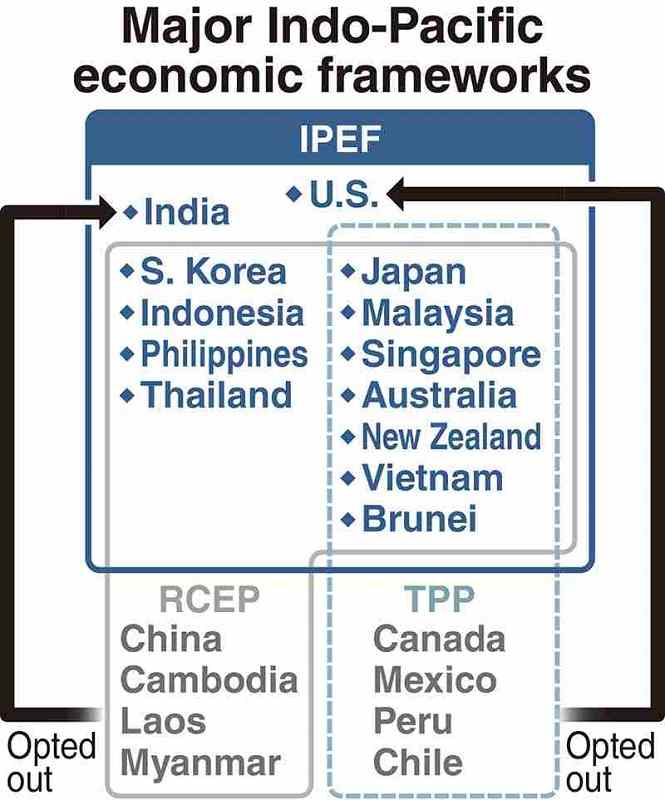
Biden first introduced the idea at the East Asia Summit last October amid a heightening sense of crisis in Washington over Beijing’s growing influence.
A month earlier, China, a member of the Regional Comprehensive Economic Partnership (RCEP) agreement, had applied to join the successor of the TPP, the Comprehensive and Progressive Agreement for Trans-Pacific Partnership (CPTPP), of which the United States is not a member.
The TPP was originally promoted by the administration of former U.S. President Barack Obama as a network to contain China, but the administration of his successor, Donald Trump, withdrew from the agreement on the grounds that it threatened industries and jobs in the United States.
The Biden administration, which has adopted a protectionist stance out of consideration for the working class, came up with IPEF in a bid to fill the void for U.S. economic partnership in Asia. However, the framework does not include a reduction or elimination of tariffs, as deep-rooted concerns remain in the United States about the impact of such measures on domestic industries and employment.
In the months leading up to its launch, Japan mediated between the United States and the members of the Association of Southeast Asian Nations (ASEAN). According to diplomatic sources, Tokyo advised Washington to tone down the anti-China posturing to avoid making ASEAN nations with strong economic ties with Beijing pick sides.
A framework that does not deal with tariffs has few advantages for economies that want to sell more products in the United States, so it was thought that it would only attract a small number of countries.
However, Washington promoted fields in which there is high interest in emerging Asian countries, such as strengthening semiconductor supply networks and infrastructure development, and lowered the hurdle for involvement in the framework by inviting participation in individual fields.
After persistent efforts, seven of the 10 ASEAN countries decided to join.
“IPEF will not be able to fulfill its purpose unless it obtains active cooperation in Southeast Asia by demonstrating real benefits,” said a source linked to U.S. trade negotiations.
The actions of the ASEAN countries will likely be a focus in future negotiations.
Japan aims to strengthen the economic partnership with the United States through active involvement in the framework and attract Washington back to the CPTPP.
At a joint press conference with Biden on Monday, Kishida said, “Japan hopes to see the United States return to the [CP]TPP from a strategic perspective.”
Top Articles in Business
-

Prudential Life Insurance Plans to Fully Compensate for Damages Caused by Fraudulent Actions Without Waiting for Third-Party Committee Review
-

Japan, U.S. Name 3 Inaugural Investment Projects; Reached Agreement After Considerable Difficulty
-

Japan’s Major Real Estate Firms Expanding Overseas Businesses to Secure Future Growth, Focusing on Europe, U.S., Asia
-

SoftBank Launches AI Service for Call Centers That Converts Harsh Customer Voices into Softer Voices
-

Transport Companies See Opportunity in Narita Expansion; Airlines, Railways Prepare to Meet Expected Growth in Demand
JN ACCESS RANKING
-

Producer Behind Pop Group XG Arrested for Cocaine Possession
-

Japan PM Takaichi’s Cabinet Resigns en Masse
-

Man Infected with Measles Reportedly Dined at Restaurant in Tokyo Station
-

Israeli Ambassador to Japan Speaks about Japan’s Role in the Reconstruction of Gaza
-

Videos Plagiarized, Reposted with False Subtitles Claiming ‘Ryukyu Belongs to China’; Anti-China False Information Also Posted in Japan





